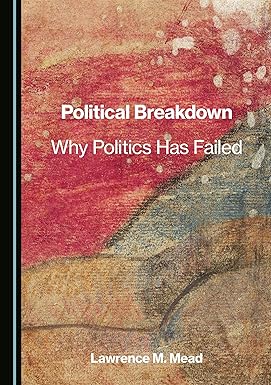
By Lawrence M. Mead.
Cambridge Scholars Publishing, 2025.
Hardcover, 183 pages, $110.95.
Reviewed by Frank Filocomo.
If it wasn’t already obvious, today’s politics is burdened by third rails, sacred cows that ought not be disturbed, and loaded taboos. Racial and other sectarian sensitivities inhibit much-needed discourse, thus making Americans walk on eggshells so as not to offend marginalized groups.
While tact and even restraint are signs of good social etiquette and connote respect, truth-seeking must be the ultimate goal of dialectic. But, as John Stuart Mill writes in On Liberty, “History teems with instances of truth put down by persecution.”
In Political Breakdown, Lawrence Mead throws tact out the window and, instead, lays bare our collective failure to properly and honestly address myriad social changes that have occurred since the 1960s—namely, widening cultural difference and group balkanization; unprecedented levels of immigration from the non-West; and the rise of identitarianism, especially from the social justice-Left.
To be sure, it would be far easier on all of us if we were to continue to bury our heads in the sand and avoid the visceral discomfort of talking about such matters, but, to Mead, this has only fed into our inability to converse with each other civilly. Once we learn to identify and come to terms with the realities of such divisive issues, we will then—and only then—begin the process of remediation and unification.
In addition to the burdens of our ever-changing socio-political landscape, an avalanche of new demands have been made by “out groups” who make lofty claims about systemic injustices in American society. Mead admonishes institutional leaders not to capitulate to these groups willy-nilly. Rather, he argues that claimants must meet “three civil limits if their grievances are to be taken seriously: “They must (1) show that an unjust injury has really occurred, (2) that redressing it is in the general interest, and (3) that solutions through government are really possible.”
These criteria are very on-brand for Mead, an implacable advocate for welfare work requirements who has never settled for mediocre rationales or pity-ridden excuses.
When I was Mead’s student in the Politics department at New York University, he always made it abundantly clear that the onus was on us (his students) to provide robust defenses of our claims. While seemingly harsh and perhaps lacking in sympathy, Mead is someone who detests the bigotry of low expectations. Indeed, he expects more—a lot more—from everyone.
Regarding Mead’s “civil limits on claims,” he is of the belief that today’s out-groups fall short. Systemic racism, for example, was stamped out decades ago, according to Mead. While minorities in the era of Jim Crow had tangible evidence of racial discrimination, such as separate water fountains for people of color, there are no such discriminatory practices to point to today. Therefore, black social justice advocates fail the first of Mead’s three civil limits on claims: proof that “an injury has really occurred.” Thus, limits two and three become non sequiturs.
These assertions might seem, especially to those unfamiliar with Mead’s earlier work, cold and dismissive, but they are, nonetheless, backed up in a hard logic. Mere feelings of injustice or bigotry are, therefore, insufficient; claimants must do more to prove that such social afflictions are, in fact, real.
Much of Mead’s outlook, be it on race, poverty, or immigration, is colored by his binary—and, frankly, intuitive—view of cultural difference. That is, where the West is typified by an individualist and entrepreneurial culture, the non-West is much more collectivistic and deferential. This is the thesis of his provocative book, Burdens of Freedom: Cultural Difference and American Power, a work that is nothing short of a game-changer which, if ever widely disseminated, could fundamentally change the way Americans’ look at cultural difference.
His writing on culture has, regrettably, resulted in much consternation, primarily from elite academia. In a 2020 statement from NYU’s Faculty of Arts and Science and Wagner Leadership, Mead was condemned for his views. The statement concludes with the following line: “Racism, bigotry, hatred, intolerance, and discrimination have no place in our classrooms or in our academic community.” What you won’t find in the statement, however, is any grappling with the merits of Mead’s arguments. Instead, in the most academically lazy and cowardice way, its authors engage in an embarrassing kind of pearl-clutching and moral sanctimoniousness. It is beneath the institution.
While talk of combating identitarianism and stemming the flow of illegal immigration have become commonplace on the political Right, Mead doesn’t advocate for “defeating the Left.” Coming from the world of 1990s welfare reform, which required him to work with ideologically disparate actors, Mead envisions a politics of collaboration and pragmatic policy implementation for the common good. This point is bolstered by his mention of Braver Angels (BA), a nonprofit founded in 2016 with the sole intent of depolarizing the American body politic and encouraging civil dialogue. BA promotes what international relations scholar Robert Wright often refers to as “cognitive empathy.” That is, the ability to hear out others’ claims without reflexively dismissing them or engaging in ad hominem attacks. Hearing one out, however, does not equate to an endorsement—or, for that matter, disavowal—of another’s argument; it creates fertile ground for a pluralism of ideas. For Mead, it is only when we embrace the “small-l” liberal tradition of ideological pluralism and debate on the merits that we can progress as a nation.
Frank Filocomo is the Advancement Coordinator at RealClearFoundation. His work has been published in National Review, the Federalist, The University Bookman, and elsewhere.
Support the University Bookman
The Bookman is provided free of charge and without ads to all readers. Would you please consider supporting the work of the Bookman with a gift of $5? Contributions of any amount are needed and appreciated!